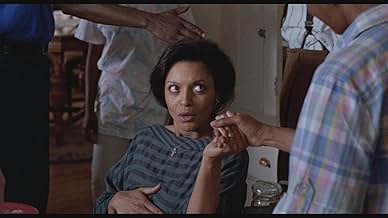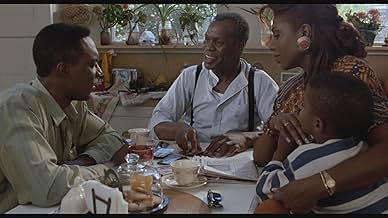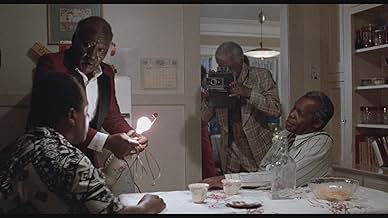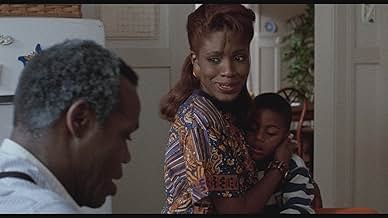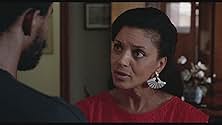CALIFICACIÓN DE IMDb
7.1/10
3.3 k
TU CALIFICACIÓN
Un viejo conocido carismático llega a la ciudad, lo que causa problemas a una familia apacible.Un viejo conocido carismático llega a la ciudad, lo que causa problemas a una familia apacible.Un viejo conocido carismático llega a la ciudad, lo que causa problemas a una familia apacible.
- Premios
- 7 premios ganados y 13 nominaciones en total
DeVaughn Nixon
- Sunny
- (as Devaughn Walter Nixon)
DeForest Covan
- Fred Jenkins
- (as DeForest Coven)
- Dirección
- Guionista
- Todo el elenco y el equipo
- Producción, taquilla y más en IMDbPro
Opiniones destacadas
This film reminded me a bit of some of Toni Morrison's novels-about the shared heritage of American descendants of slaves, the grief and the magic. The film begins in a Black neighborhood that is if anything a more virtuous reflection of postwar middle-class white neighborhoods: neatly-kept bungalows with big yards, kids playing in the street (and with pigeons on the rooftop) and practicing musical instruments (a trumpet, in this case), a paterfamilias who keeps chickens and irons his own slacks, a mother who supplements her shopping with produce from her own garden and works as a midwife, two handsome sons with wives and a (quiet, respectful) child each.... The main problem is that the younger son's wife is bored silly by the agricultural table-talk at Sunday dinner: she sells real estate, and that is what land is to her. Also, the roof leaks, and the two sons can't get together to fix it.
Then Gideon remarks that he can't find his "toby" (thank you, subtitles, and also Wikipedia for mentioning this as a synonym of a mojo), a teapot with marbles in it falls to the floor and breaks, and Harry arrives. Harry is from that place in the South from which Gideon and Suzie emigrated when their sons were children. Harry is the drinking, gambling, womanizing friend who keeps his possessions in a few cardboard boxes instead of a bungalow. He draws to him a whole crowd of Gideon's fellow emigrés, mostly men, and with them comes fierce misogyny and the potential for violence.
Enough with the plot summary. This is a rich and entertaining film. I see that many of the other reviews are from this very month, so I guess it has just started streaming.
Then Gideon remarks that he can't find his "toby" (thank you, subtitles, and also Wikipedia for mentioning this as a synonym of a mojo), a teapot with marbles in it falls to the floor and breaks, and Harry arrives. Harry is from that place in the South from which Gideon and Suzie emigrated when their sons were children. Harry is the drinking, gambling, womanizing friend who keeps his possessions in a few cardboard boxes instead of a bungalow. He draws to him a whole crowd of Gideon's fellow emigrés, mostly men, and with them comes fierce misogyny and the potential for violence.
Enough with the plot summary. This is a rich and entertaining film. I see that many of the other reviews are from this very month, so I guess it has just started streaming.
Maybe it was the bizarre photo of a smirking, card-holding Danny Glover that always gave me the wrong impression of this film. I'm not entirely sure what I expected it to be, but I'm relatively certain I wasn't expecting a quiet family drama.
Writer/director Charles Burnett doesn't reach hard for big statements. The film appears to take place in the 1950s-60s (I couldn't be sure), but the time period isn't chosen out of a desire to create a plot focused on race relations. In fact, the drama is entirely centered around a single small family, and a wild friend from way in the past (Harry, played by Danny Glover). Cinematographer Walt Lloyd creates a familiar environment, whether or not it happens to be personally familiar to the viewer. Everything feels warm and slightly worn, including personalities and ways of speaking.
Although my personal family history couldn't be more different than the family depicted in this film, the character of Samuel "Babe Brother" (Richard Brooks) really hit home for me. His attitude on life and relationship with his father mirrors my own all too closely. It's the honestly of character depiction and interaction that brings out so much truth from Charles Burnett's writing. Everything comes together to make a perfectly realized story of absolute truth. This may just be a great film.
Writer/director Charles Burnett doesn't reach hard for big statements. The film appears to take place in the 1950s-60s (I couldn't be sure), but the time period isn't chosen out of a desire to create a plot focused on race relations. In fact, the drama is entirely centered around a single small family, and a wild friend from way in the past (Harry, played by Danny Glover). Cinematographer Walt Lloyd creates a familiar environment, whether or not it happens to be personally familiar to the viewer. Everything feels warm and slightly worn, including personalities and ways of speaking.
Although my personal family history couldn't be more different than the family depicted in this film, the character of Samuel "Babe Brother" (Richard Brooks) really hit home for me. His attitude on life and relationship with his father mirrors my own all too closely. It's the honestly of character depiction and interaction that brings out so much truth from Charles Burnett's writing. Everything comes together to make a perfectly realized story of absolute truth. This may just be a great film.
One good role for Danny Glover can erase the memory of several 'Lethal Weapon' and 'Predator' sequels, but it took a small, independently produced feature to bring the best out of one of Hollywood's hardest working actors. In this modest comedy Glover plays an enigmatic travelin' man named Harry, arriving unannounced at the home of some old friends and adding a subtle tension to the domestic friction already eroding three generations of family ties. But the trouble with Harry is less what he is than what he represents: the ghost of old traditions lurking in the cultural closet, and for a family already sensitive to portents and omens he might be the embodiment of all their superstitions. Writer director Charles Burnett keeps the viewer on guard with his elusive plot and complex characters, but the film is understated almost to a fault. The metaphors and hidden meanings (better suited to a stage play) help create a portentous mood, but in the end leave a lot unexplained.
This film involves a black family in southern California. They have a rather autocratic father who is impatient but also kind. There are two brothers who are polar opposites. One is shiftless and married and searching for a place in the world. The other is hard working and settled but also rather dull. Then an old friend named Harry shows up. He is played by the gregarious Danny Glover. The problem is this guy is evil but charming. Soon bad things happen. I rented this blindly and am glad I got a chance to watch it. It has a wonderful cast with Richard Brooks as the wayward son and several other fine actors.
Danny Glover shows up at the door of his old friends and moves in. Over the next few weeks, a lot of stuff happens.
Charles Burnett's movie seems to be a slice of life piece, showing the variety and contradictions of a small Black community, nominally in Los Angeles. There are tough guys and weak guys, but it's a solid working-class community where the choir sings polite gospel, and the preacher comes to visit the visit and chide them for using "old-fashioned" obeah cures instead of prayer.
This isn't the world of rap or youth, but of the older, settled community. In some ways it seems idyllic, with no drug dealers or gang violence, the standard modern cinematic image of Black communities. There's no rap music, but there is the blues and a small boy playing a trumpet very loudly.
It's warm and frequently silly, and beneath it is a had recognition of being unregarded. I found it very familiar, and if the older folks had been speaking Yiddish, i might have been, if not my own home growing up, then a cousin's, or that of one of my father's old friends.
Charles Burnett's movie seems to be a slice of life piece, showing the variety and contradictions of a small Black community, nominally in Los Angeles. There are tough guys and weak guys, but it's a solid working-class community where the choir sings polite gospel, and the preacher comes to visit the visit and chide them for using "old-fashioned" obeah cures instead of prayer.
This isn't the world of rap or youth, but of the older, settled community. In some ways it seems idyllic, with no drug dealers or gang violence, the standard modern cinematic image of Black communities. There's no rap music, but there is the blues and a small boy playing a trumpet very loudly.
It's warm and frequently silly, and beneath it is a had recognition of being unregarded. I found it very familiar, and if the older folks had been speaking Yiddish, i might have been, if not my own home growing up, then a cousin's, or that of one of my father's old friends.
¿Sabías que…?
- TriviaIn 2017, the film was selected for preservation in the United States National Film Registry by the Library of Congress as being "culturally, historically, or aesthetically significant".
- Citas
Harry: Ya, but you can't do the shuffle with one leg. You and your wife, in fortunate. Now I'm not talking about you and what you do but some folks that always run to help the victim, deep down are attracted to pain and suffering and love to be near the dying.
Junior: All the people working with us are really doing it 'cause they hate to see suffering.
Harry: You never know what's in the heart and just because you can cry doesn't make you human.
- ConexionesReferenced in Siskel & Ebert & the Movies: Congo/The Glass Shield/Pocahontas/Fluke (1995)
- Bandas sonorasPrecious Memories
Traditional, attributed to J.B.F. Wright
Performed by Sister Rosetta Tharpe (as Sister Rosetta Thorpe)
Courtesy of SAVOY Records
Selecciones populares
Inicia sesión para calificar y agrega a la lista de videos para obtener recomendaciones personalizadas
- How long is To Sleep with Anger?Con tecnología de Alexa
Detalles
Taquilla
- Total en EE. UU. y Canadá
- USD 1,161,135
- Fin de semana de estreno en EE. UU. y Canadá
- USD 19,295
- 14 oct 1990
- Total a nivel mundial
- USD 1,161,135
- Tiempo de ejecución
- 1h 42min(102 min)
- Color
- Mezcla de sonido
- Relación de aspecto
- 1.85 : 1
Contribuir a esta página
Sugiere una edición o agrega el contenido que falta


